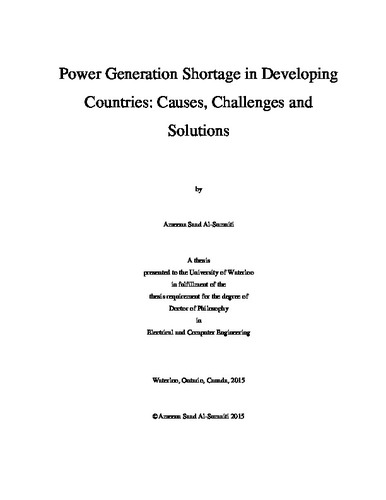| dc.contributor.author | Al-Sumaiti, Ameena Saad | |
| dc.date.accessioned | 2015-08-14 13:56:45 (GMT) | |
| dc.date.available | 2015-08-14 13:56:45 (GMT) | |
| dc.date.issued | 2015-08-14 | |
| dc.date.submitted | 2015 | |
| dc.identifier.uri | http://hdl.handle.net/10012/9531 | |
| dc.description.abstract | Electricity consumers in developing countries are seeking reliable electricity services to subsidize the economy and assist the rising population. Underprivileged electricity services are major concerns for these consumers because of power generation shortage. Electricity consumers will be disconnected from the grid as a mean of reducing the total load connected to the distribution grid. In many developing countries, the problem is considered to be severe due to population growth. It is also recognized that electricity shortage negatively affects the quality of life of the residential consumers in these countries.
This thesis proposes ways to reduce the severe effect of power generation shortage on developing countries’ consumers and these ways are appropriate for application in remote communities in Canada. These reductions are targeted to utility and residential electricity consumers to address the power generation shortage problem in developing countries.
The current status of electricity demand restricts grid expansion due to the limited available power generation. With population growth, there is a demand for a system reinforcement. This reinforcement is either by controlling the behavior of electricity consumers or accommodating new electricity supply resources. Since the behavior of electricity consumers is a major factor contributing to high electricity demand compared to the available power generation, this thesis will focus on optimally scheduling residential demand to minimize the negative gap between the current supply and the future expected demand by proposing two approaches based on scheduling the supply of electricity to either houses or devices within them. These approaches account for the uncertainty in many factors governing consumers’ perception to utilize electricity. From the utility aspect, this thesis proposes improving the grid efficiency by considering investments in alternative sources of supply, such as renewable energy sources to support the current generation to accommodate population growth. The economical aspects to select the best distribution generation sources are shown in this thesis. The thesis will also investigate how current policies can be modified to encourage investors in the power sector to build these resources. It is well known that developing countries do not have the adequate financial resources to build these resource systems. The thesis will also target finding the proper sizes of such energy systems by considering the uncertainty in the generation from these resources to address the power generation shortage. This solution is further expanded by considering the cooperation between the utility and the residential consumers to reduce the size of renewable energy systems while considering residential consumers’ demand scheduling.
The thesis sets recommendations targeting electricity services improvement to facilitate not only consumers’ lives, but also countries’ economies. | en |
| dc.language.iso | en | en |
| dc.publisher | University of Waterloo | |
| dc.subject | Power generation shortage | en |
| dc.subject | developing countries | en |
| dc.title | Power Generation Shortage in Developing Countries: Causes, Challenges and Solutions | en |
| dc.type | Doctoral Thesis | en |
| dc.pending | false | |
| dc.subject.program | Electrical and Computer Engineering | en |
| uws-etd.degree.department | Electrical and Computer Engineering | en |
| uws-etd.degree | Doctor of Philosophy | en |
| uws.typeOfResource | Text | en |
| uws.peerReviewStatus | Unreviewed | en |
| uws.scholarLevel | Graduate | en |

